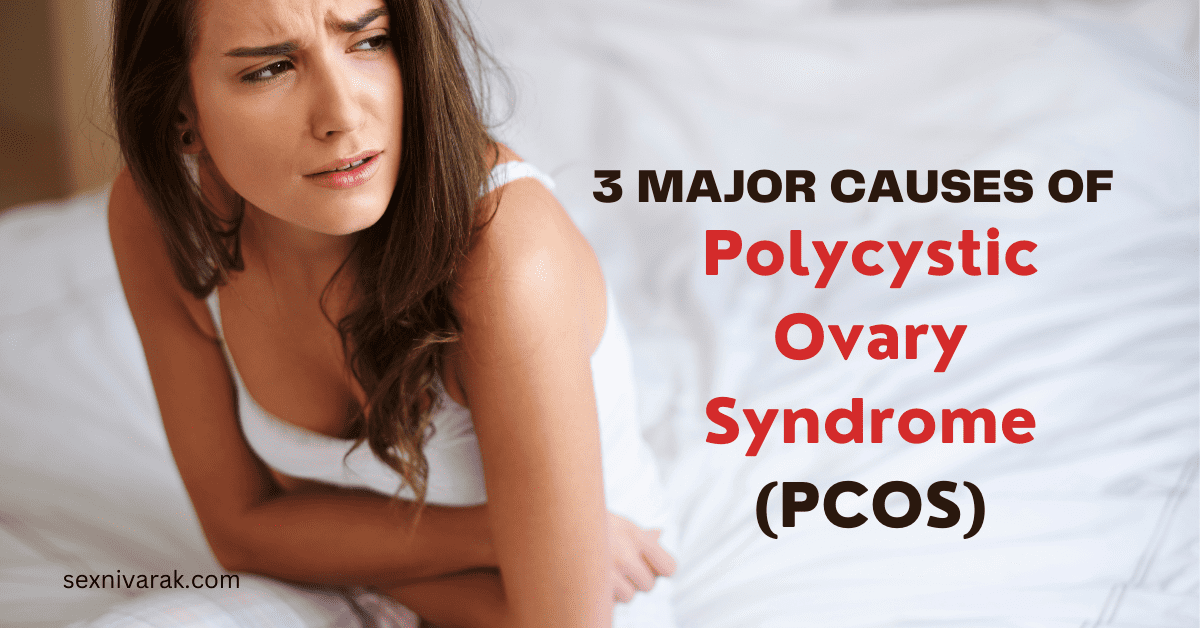It is still unclear what are the causes of PCOS (Polycystic Ovary Syndrome) are, but most experts believe diet and lifestyle are involved. PCOS is a condition that happens when women’s ovaries produce an abnormally high level of androgens, male sex hormones.
In the Polycystic Ovary Syndrome condition, ovaries develop a large number of small cysts (fluid-filled sacs). However, a few women with this illness do not develop cysts, while others do.

Ovulation takes place when a fully grown egg is discharged from an ovary. This occurs when it is fertilized by a male sperm. If the egg is not fertilized, it is ejected from your body during your period. These cysts produce hormones known as androgens.
Women with Causes of PCOS often have high levels of androgens. This can affect a woman’s menstrual cycle.
Additionally, it can trigger several PCOS symptoms. Polycystic Ovary Syndrome is frequently treated with medication. This does not cure PCOS, but it does assist in reducing symptoms and avoiding a few more health issues.
Read More: PCOS vs PCOD
What are the Causes of PCOS (Polycystic Ovary Syndrome)?
The exact causes of PCOS are unknown, but it is thought to be related to abnormal hormone levels. Just like PCOD, Polycystic Ovary Syndrome can be caused due to poor lifestyle. Apart from being caused by sedentary lifestyle habits, do you know what causes Polycystic Ovary Syndrome?
The answer is- Insulin Resistance, Hormone Imbalance, and genetically inherited.
- Insulin Resistance.
Pancreas produces insulin hormones which help in controlling the amount of sugar in the blood. It helps in the transportation of glucose from the bloodstream into cells, where it is broken to produce energy. Insulin helps to move glucose from the blood into the cells, at the place where it is broken to produce energy.
The term “insulin resistance” refers to the body’s tissues being resistant to insulin’s effects. As a result, the body must produce more insulin to compensate for the loss.
High insulin levels cause the ovaries to overproduce testosterone, which interferes with the growth of follicles (sacs in the ovaries where eggs grow) and prevents the normal ovulation process.
Insulin resistance could also contribute to weight gain, which can increase PCOS symptoms since excess fat cause the body to produce more insulin.
- Hormone Imbalance
Several women with PCOS have an unequal distribution of certain hormone levels, including:
- Increased levels of prolactin – a hormone that stimulates the production of milk by the breast glands during pregnancy (only in certain women with PCOS).
- Increased levels of testosterone – a hormone that is frequently associated with men despite being produced in small amounts by all women.
- Low levels of SHBG (sex hormone-binding globulin) – a blood protein that binds to testosterone and minimizes its impact.
- Increased levels of luteinizing hormone (LH) – stimulate ovulation but can have unnatural effects on the ovarian follicles if levels are very high.
The exact cause of these hormonal changes is unknown. The changes could also be caused by the system’s insulin resistance.
- Genetically Inherited
Polycystic Ovary Syndrome (PCOS) can run in families in some cases. You are likely to be at a higher risk of getting PCOS if any of your family members, such as your mother, sister, or aunt, do. Therefore, it is beneficial to know your family history when it comes to PCOS.
This suggests that PCOS may have a genetic component, though specific genes linked to the condition have yet to be identified.
Conclusion
What causes Polycystic Ovary Syndrome (PCOS) is still unknown, most experts believe that a combination of genetic and environmental factors, such as diet and lifestyle, may be involved. In addition, certain hormones like insulin and testosterone have been linked to the condition. As such, early diagnosis and treatment of PCOS can help to reduce the severity of the symptoms and mitigate any potential health risks associated with the condition.


